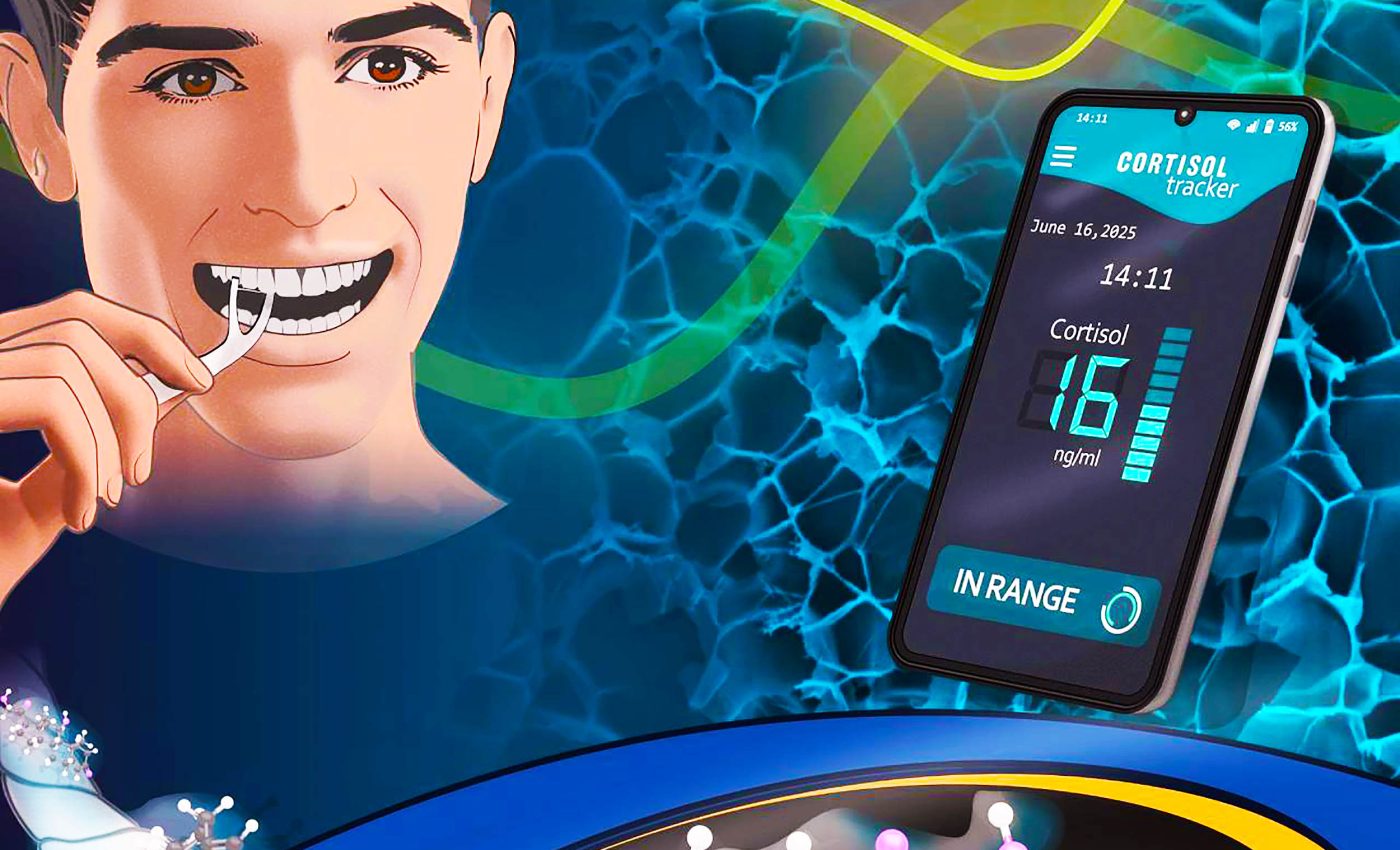
Stress-detecting dental floss could revolutionize personal health
A team of engineers has recently revealed an innovative new tool for tracking stress: a modified dental floss device that can detect cortisol, the body’s primary stress hormone, in real time from saliva.
Constructed by scientists at Tufts University, the device could offer a simple, inexpensive, and user-friendly alternative to traditional stress-monitoring methods. Those methods typically rely on self-reported questionnaires or costly psychiatric evaluations.
“It started in a collaboration with several departments across Tufts, examining how stress and other cognitive states affect problem solving and learning,” said Sameer Sonkusale, a professor of electrical and computer engineering and lead researcher on the project.
Measuring stress through flossing
Scientists have long recognized that stress can cause harmful long-term effects. Chronic exposure can increase blood pressure, suppress the immune system, and contribute to conditions like depression, anxiety, and cardiovascular disease.
“We didn’t want to create an additional source of stress, so we thought, ‘can we make a sensing device that becomes part of your day-to-day routine?’ Cortisol is a stress marker found in saliva, so flossing seemed like a natural fit to take a daily sample,” said Sonkusale
Despite its serious implications, monitoring stress levels over time remains a challenge. This new floss-based technology could change that.
Tiny device with big potential
The stress-sensing floss is designed to look and feel just like a standard plastic floss pick. The difference lies in the built-in electronics that sit in the handle.
As a person flosses, saliva wicks up through the floss via capillary action, traveling into the handle and across a sensor tab. Electrodes embedded in this tab then detect the presence and concentration of cortisol in the sample.
A technology called electropolymerized molecularly imprinted polymers, or eMIPs, powers the detection mechanism.
A new approach to stress
Originally developed nearly 30 years ago, eMIPs work much like a mold. Researchers form a polymer around a target molecule – in this case, cortisol – and then remove the molecule, leaving behind an imprint.
This “mold” has both the physical and chemical shape needed to recognize and bind with free-floating cortisol molecules in new samples.
“The eMIP approach is a game changer,” Sonkusale said. “Biosensors have typically been developed using antibodies or other receptors that pick up the molecule of interest. Once a marker is found, a lot of work has to go into bioengineering the receiving molecule attached to the sensor.”
Electropolymerized molecularly imprinted polymers do not require extensive investments in developing antibodies or receptors. Instead, a polymer cast can be rapidly created whenever a new marker for stress, disease, or any condition is discovered.
A versatile health tool
The floss sensor’s modular design and eMIP system can adapt to detect various biomarkers, not just cortisol. It could potentially track glucose for diabetes, estrogen for fertility monitoring, or other molecules linked to cardiovascular health, cancer, and neurodegenerative diseases.
There is also potential for integrating multiple sensing capabilities into a single device. A multi-biomarker floss sensor could deliver a more comprehensive view of a person’s health by detecting several chemical indicators simultaneously.
While still in development, the sensor has demonstrated accuracy comparable to the best stress-detection tools currently on the market. The Tufts team is now working to commercialize the technology via a startup for use in homes and clinics.
However, the researchers emphasize that people should use this tool for ongoing monitoring rather than for initial diagnoses.
“For diagnostics, blood is still the gold standard, but once you are diagnosed and put on medication, if you need to track, say, a cardiovascular condition over time, then monitoring with the sensor can be easy and allows for timely interventions when needed,” Sonkusale said.
Managing chronic stress
One of the most striking aspects of this technology is its seamless integration into a daily routine.
Unlike wearable trackers or bulky diagnostic tools, the floss device requires no new habits or specialized training. Users simply floss as usual and get an immediate snapshot of their stress levels.
Sonkusale and his research group developed the new device as part of a broader portfolio of thread-based sensor technologies.
These include sensors embedded in clothing to detect motion, sweat metabolites, and environmental gases, as well as transistors for flexible electronics. The dental floss sensor, however, may be one of their most user-friendly innovations yet.
The research could help pave the way toward more personalized, real-time health monitoring. This innovation makes it easier for individuals to manage chronic stress and its long-term health effects with a simple swipe of floss.
The study is published in the journal ACS Applied Materials and Interfaces.
—–
Like what you read? Subscribe to our newsletter for engaging articles, exclusive content, and the latest updates.
Check us out on EarthSnap, a free app brought to you by Eric Ralls and Earth.com.
—–













